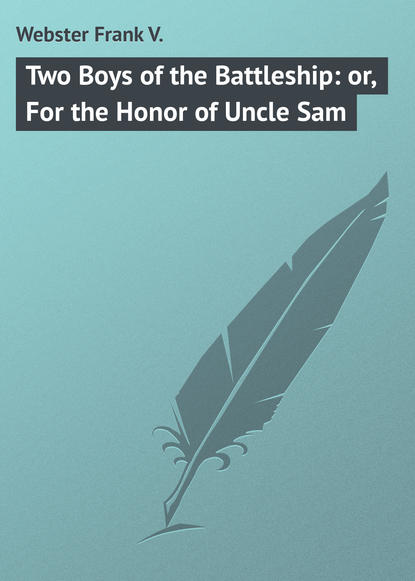По всем вопросам обращайтесь на: info@litportal.ru
(©) 2003-2024.
✖
Two Boys of the Battleship: or, For the Honor of Uncle Sam
Настройки чтения
Размер шрифта
Высота строк
Поля
Instantly the officer gave the signal. Bells began ringing throughout the great battleship. The general call was sounded, and blue-jackets swarmed from their hammocks.
“It’s a riot!” cried a commanding officer, as soon as he had read the message flashed by the signal lights. “It’s what we’ve been expecting! The revolutionary party is stirring up a riot against the American residents!”
“Man the boats! Get a landing party ashore. Infantrymen and light artillery guns! We’ll show these chaps what it means to fight Americans! Lively, boys!”
Across the dark waters on which sparkled the reflections of the signal lights, came hoarse cries and shouts, as well as the reports of guns.
In an instant the battleship was astir. The men sprang to their stations, and Ned and Frank were among the first. Into the boats they piled, well armed, and in other boats that accompanied them were the light field pieces. They were on their way to quell the riot.
But what it was all about, the cause of it, and how it would affect them and their uncle, Ned and Frank could only guess.
CHAPTER XXI – UNEXPECTED NEWS
Great searchlights from the battleship illuminated a scene that was one of great activity. Boats were pulling away from the side of the Georgetown, boats filled with eager, excited men and youths, including our two friends. Every one was armed, and each had plenty of cartridges in reserve. There were also light field pieces taken apart for transportation, but which could easily be set up. The men had been drilled for just such an emergency as this.
Several motor launches towed the cutters filled with the blue-jackets. There was no time for rowing, with the growing excitement on shore ever on the increase.
“Say, it sure is a row!” exclaimed Ned, for as they came nearer they could hear shots and shouts and yells.
“It’s a regular riot!” said Frank.
“That’s what it is,” said a petty officer in the boat containing Frank and Ned. “It’s a riot, and that’s what we’re going ashore for – to end it!”
In the path of the illumination from the battleship’s searchlights the boats sped on. Now could be seen a dark mass of men fighting near the shore.
“They’re going to dispute our landing,” observed Tom Dawson.
“Well, they won’t dispute it very long,” said Frank, significantly, as he tapped his rifle. “We’re ready for them.”
Up to the beach, through surf that was not heavy, went the boats. Before they grounded the men and youths leaped out into the water and fairly raced up the shingle. In an instant they formed in line and waited for orders from their officers. There were nearly three hundred of them, for the Georgetown carried over a thousand men, though of course many of them were not available for fighting duty on shore. However, several hundred more could be sent in case the impending conflict should go against the first men who landed.
“Attention, men!” called the commanding officer. “I want you to understand what this is about. Our captain has been appealed to for protection by a number of United States citizens living here. According to the signals flashed to us from shore our citizens are being attacked by a mob of the revolutionists. Just why, we needn’t go into now. But we must give protection to our friends, and we are going to try and drive off the mob.”
“Hurrah!” some one cried.
“Lively now, men!” went on the officer. “Forward! There they are!”
The dark mass of fighters which had been near the shore before the boats landed had gone farther up the strand just as the battleship men arrived. But now they were again rushing down the beach.
There were shouts, yells and cries, mingling with the pop of small arms. Most of the shouting was in a foreign tongue, Portuguese, most likely, so Ned and Frank thought.
“There must be a lot of our citizens here,” said Ned, as he saw that there were two good-sized crowds, one evidently attacking the other. And it was this attack and repulse, this backward and forward movement, as the tide of fighting changed, that had taken the conflicting forces away from the water’s edge, and now, once more, brought them to it again.
“Those who are being attacked aren’t all Americans,” said a petty officer near our heroes. “Our citizens threw their lot in with the inhabitants here who are opposed to the revolutionists, and the latter are attacking the loyal natives as well as our men. Now we’ll – ”
But he had no time to explain further, as sharp orders to advance came. It was not very dark, though it was about midnight, for the moon shone brightly, and now the battleship had brought to bear on the scene all her powerful searchlights.
“Forward and at ’em!” came the command. “Protect the Americans!”
Snarling cries came in answer from the revolutionists. But they did not give way at once, though they must have realized that they were about to be attacked by some of the best-trained fighting men in the world, and some of the bravest – the United States blue-jackets.
The crack of guns, which had ceased for a moment, now began again more spitefully than before. The two parties in the riot were firing at one another, and bullets began to sing over the heads of the battleship boys. Instinctively several ducked. Others laughed.
“You needn’t duck,” some one near Frank called. “When you hear the bullet it’s past you.”
“Forward! Forward!” came the cries.
“Over this way!” a voice shouted in English. “Over this way, battleship boys! They’re beating us back!”
It was a cry for help from those being attacked by the rioters.
Ned and Frank found themselves in a division that was being led off to one side for a flank attack. The hearts of both lads were beating violently. It was the first time they had ever been under fire, and for the first time they were about to fire a shot at a human being. It was a strange feeling, but they felt that right was on their side. And they were going to save the lives of fellow citizens who were being attacked by a foreign mob.
“It’s just like a football rush!” cried Ned in Frank’s ear. He had to shout to be heard above the crack of the rifles.
“Come on! Come on!” yelled back Frank, just as he might have done had he and Ned been carrying the ball down the field.
As yet, though the hum and whine of bullets was almost constant in the air, none of the battleship force had been hit, as far as was known. But suddenly a lad in the ranks behind Frank and Ned gave a convulsive cry and fell to the ground.
“They got me!” he cried. “It’s only in the leg, though,” he added an instant later. “Go on, boys, and give ’em one for me!”
“Three cheers for Wright!” some one called. And they were heartily given, but the advance did not halt.
On rushed the battleship boys toward the mass of rioting revolutionists. They had swung around now, to attack them in the rear and to one side.
“Halt!” came the order from the lieutenant leading the advance. “Ready! Aim! Fire over their heads!”
He wanted, if possible, to quell the riot without taking life. A volley crashed out, and there came a return fire from the revolutionists. Several of the men from the Georgetown fell. Something like a shout of anger ran through the ranks.
“Fire low!” yelled the lieutenant. This time there was a different story. Ned and Frank could not see at whom they were shooting, because they were now in some of the water front streets of the capital and the buildings cast shadows. They could see, however, a dark mass of humanity before them, and at this they and the others fired. A number were seen to fall, and then the tide of battle suddenly turned.
With howls of fear in their foreign tongue the revolutionists turned and fled. They had had enough in one volley from the rifles of the battleship’s force. It was an easily won victory – for the time being.
“Come on! After ’em!” yelled Ned, eager for the fray.
“Halt! Hold on! No pursuit! We merely want to stop the riot, and have no wish to inflict punishment,” said the lieutenant. “We’ll hold the ground here for a time. Now, who are hurt?”
A number had received bullet wounds, it developed, though none was necessarily fatal. Some were incapacitated through wounds in legs or arms, and these were quickly sent to the rear to be transported to the ship for treatment. Sentries were posted, and a little later some of the Americans in whose interests the battleship force had been landed came up. They had guns, and had been fighting against the revolutionists with the friendly citizens. They reported that the revolutionary force had retreated to the hills back of the city.
“Is that where the revolutionists have their headquarters?” asked Frank of one American, who said he owned a large coffee warehouse in front of which the battleship boys were standing.
“Yes, in between those two hills.”
“So that’s why we fired at them,” said Frank in a low voice to Ned. “It was to scare them out.”
“Only it didn’t; or, rather, it brought them into town,” Ned replied.
The American business man, who said his name was Paige Kennedy, stated that he had large interests in Uridio, as had many of his American friends, and that these interests were seriously threatened by the revolutionists.










